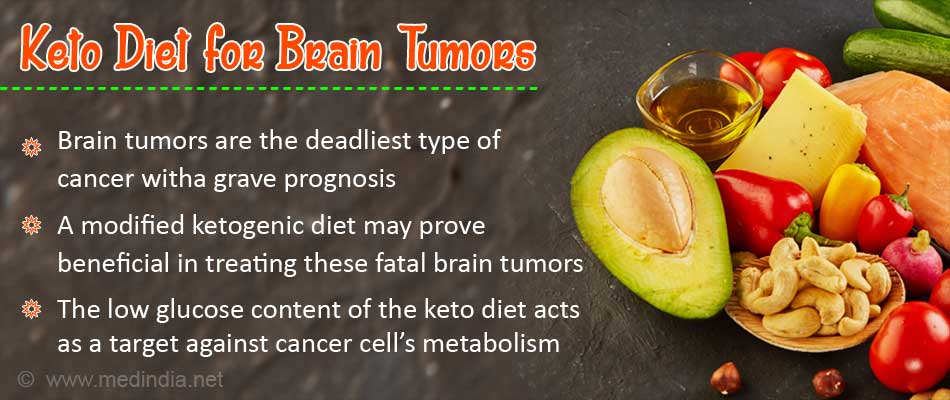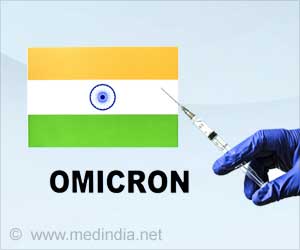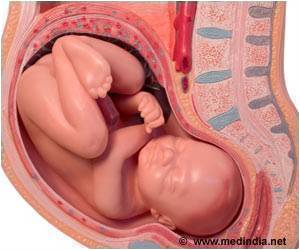Emerging researches on animal models support the efficacy of the ketogenic diet (KD) in brain tumors. It is established that brain tumor cells depend on glucose as their prime energy source. Hence targeting the glucose metabolism of these cancer cells may hit the jackpot.
– star-shaped glial cells. It is the most common type of brain tumor in adults. Annually, astrocytomas contribute to about 15,000 new cases in the US with males being affected more often than females (1.3: 1).
Symptoms depend upon the location of the tumor in the brain. Some of the obvious symptoms include worst morning headaches, visual disturbances, speech problems, first episode of seizure, limb weakness, and reduced cognition.
The prognosis relies upon the grade of the tumor. Grade 1 tumors can be cured by surgery alone with a 96% survival rate at 5 years. However, grade 4 tumors give only up to 15 months of survival. As there are no effective treatments for these types of brain tumors, any new advances are invited.
What is a Ketogenic Diet?
The ketogenic diet usually comprises high fat, limited protein, and low carbohydrate (less than 50g carbohydrate in 2000kcals). It is generally a complicated diet to be followed and can even produce ill-effects like sickness, tiredness, and constipation.
Patients are usually monitored on a ketogenic diet to ensure the delivery of all the essential nutrients. It was initially formulated at the Mayo Clinic in America to employ it in the management of epilepsy, especially among children.
The fat content of the diet serves as a primary fuel that drives the energy pathways. Fats are metabolized into ketones by the liver for delivery into the bloodstream, instead of glucose (from carbohydrates). This dynamic shift in biochemical cascades has been reported to offer neuroprotective effects in various neurological conditions, including brain tumors.
Ketogenic Diet and Brain Tumours
The metabolic difference between a cancer cell and a healthy cell was first described by Otto Warburg in the 1920s. It was stated that the cancer cells have a varied metabolic pathway where it solely relies upon vast amounts of glucose for its survival and rapid growth.
The cancer cells cannot utilize other sources like fats (fatty acids or ketones) to obtain their fuel. However, normal brain cells can thrive easily on ketones.
Ketogenic comes into play at this point since the main component of the diet is high amounts of fat. Since then various studies have strived hard to establish the protective role of the ketogenic diet along with the standard therapy of surgery, radiation, and chemotherapy in fatal cancers like brain tumors.
One-Two Punch Concept
An author of one of the influential books – “Cancer as a Metabolic Disease” in 2012 – Seyfried has specifically quoted the ‘one-two punch concept’ in treating brain cancers through the ketogenic diet, in his 2015 research paper.
The calorie-restricted ketogenic diet hampers the very source of the energy – glucose from the cancer cells. This chronic starvation from their prime fuel stresses and weakens the cancer cells – giving the first punch. Right when they are weak enough, they become vulnerable to cancer treatments such as radiation, chemotherapy, or hyperbaric oxygen. And there acts the second punch.
“It is like a one-two punch, stressing them with starvation by ketones, then hitting them while they are down,” says Seyfried by referring it to as “Press-Pulse” theory (detailed in 2017 paper).
What did the Study Tell us?
The study at Minneapolis enrolled 25 people with astrocytomas and was given a specific type of ketogenic diet – the modified Atkins diet (high fat, low carbohydrate, moderate protein diet) for 5 days with intermittent fasting for 2 days, for a total of eight weeks.
The participants were monitored under the supervision of a dietician for diet toleration and any serious side effects. Foods like bacon, eggs, heavy cream, butter, leafy green vegetables, and fish were given.
In the end, 21 people completed the study, with 48% following the diet completely. 2 people had serious side effects. However, the urine tests revealed that 80% of the people had reached the level where their body utilized fats and protein for fuel, rather than carbohydrates.
Shift in Metabolism
The study found changes in the metabolism of the body and the brain. There was an increase in lean body mass and reduction in the level of Hemoglobin A1c levels (average blood sugar), insulin levels, and fat body mass.
On performing specialized brain scans, it was found that the brain metabolites had changed with an increase in concentrations of ketones and metabolic changes in the tumor.
“Of course more studies are needed to determine whether this diet can prevent the growth of brain tumors and help people live longer, but these results show that the diet can be safe for people with brain tumors and successfully produce changes in the metabolism of the body and the brain,” Strowd said.
The study also noted that a high amount of contact with participants may be a limitation to the study, as this may not be feasible on a larger scale.
Critics to the Concept
On the contrary, other scientists affirm that destroying cancer cells is not as easy as it seems. They have complex metabolic cascades that would easily help them adapt to different survival conditions.
Thus the critic team including most of the cancer specialists, cancer scientists, and NICE (National Institute for Health and Care Excellence) guidelines note that a ketogenic diet may be limited to a theoretical benefit and not succeed in killing or slowing the growth of the cancer cells.
Currently, there are no strong researches available in humans to confirm the efficacy of a ketogenic diet. Certain limiting factors that take away the spotlight of the ketogenic diet (KD) as a treatment target for brain cancers include the following:
- The exact time course to initiate the KD as treatment
-
The dose-dependent efficacy of the carbohydrate in KD administered to the patients. - Methods that could ensure diet compliance and optimum duration of KD in patients.
Facts on Keto Diet
- One of the earliest usages of the keto diet lies in treating epilepsy since the 1920s.
-
The low-carb content of the keto diet assists individuals in losing weight. -
As there is a shift in sugar levels, it has also benefited people suffering from type 2 diabetes and metabolic syndrome. It eases insulin resistance. -
It helps in dropping the triglyceride levels and enhances HDL – good cholesterol. -
Metabolic changes are also notable in burning down the extra stored fats for fuel. This cuts down the risk for various other vascular diseases and heart diseases. - As the diet also holds anti-inflammatory effects, it may prove beneficial in reducing the risk for neurodegenerative diseases like Alzheimer’s disease and Parkinson’s disease.
References:
- The ketogenic diet and brain tumours – (https://www.thebraintumourcharity.org/living-with-a-brain-tumour/health-fitness/diet/ketogenic-diet/)
- Astrocytoma Tumors
– (https://www.aans.org/en/Patients/Neurosurgical-Conditions-and-Treatments/Astrocytoma-Tumors) - Investigating the Ketogenic Diet As Treatment for Primary Aggressive Brain Cancer: Challenges and Lessons Learned
– (https://www.ncbi.nlm.nih.gov/pmc/articles/PMC5834833/) - Ketogenic Diet Therapy for Aggressive Primary Brain Tumors: Stratification of Survival by Patients’ Age – (https://academic.oup.com/cdn/article/4/Supplement_2/350/5845855)
Source: Medindia



